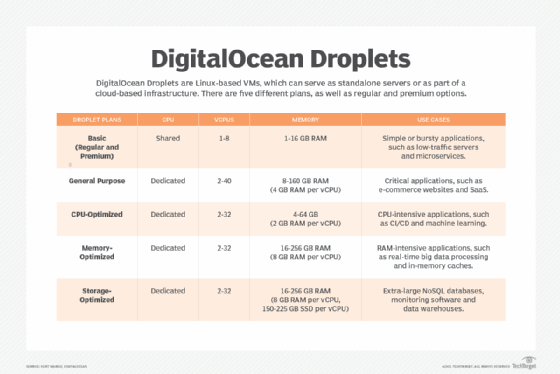DigitalOcean
What is DigitalOcean?
DigitalOcean Inc. is a cloud computing vendor headquartered in New York City with data centers worldwide that offers an infrastructure as a service (IaaS) platform for software developers. DigitalOcean is popular with open source developers and competes with Amazon Web Services (AWS).
DigitalOcean provides multiple services, but its primary offerings are for application and website hosting use cases. To deploy DigitalOcean's IaaS environment, developers launch a private virtual machine (VM) instance, which the company calls a droplet. DigitalOcean Droplets are comparable to Amazon Elastic Compute Cloud or Azure instances but don't support Microsoft Windows instances.
Developers choose the droplet's size, which geographical region and data center it will run in, and which Linux operating system (OS) it will use. Or instead of picking a Linux distribution, developers can create droplets from existing VM images that come with pre-installed applications -- an option DigitalOcean calls one-click apps.
DigitalOcean offers the following five droplet plans:
- Basic is flexible and well-suited for organizations that want to host websites and staging environments with low-intensity computing needs.
- General Purpose is designed for production workloads that need predictable compute performance.
- CPU-Optimized is well-suited for CPU-intensive tasks that need predictable performance and rely on CPU more than random access memory or input/output.
- Memory-Optimized is well-suited for workloads that have a high memory usage but low to moderate CPU usage.
- Storage-Optimized offers a minimum of 150 GB storage for each dedicated vCPU and uses non-volatile memory express and parallelism to speed up disk performance to be faster than solid-state drives.

What is DigitalOcean used for?
Digital Ocean products can be used for several purposes, including the following:
- to create VMs;
- to provision and deploy Kubernetes clusters;
- to manage databases;
- to build and deploy apps with App Platform;
- for object and block storage;
- for networking tools like virtual private cloud, load balancers and firewalls; and
- for a host of different developer and monitoring tools.
Developers can also use the DigitalOcean control panel and an open source application program interface (API) to manage and monitor their droplets. The control panel enables developers to scale and rebuild droplets based on workload changes and perform backups and redirect network traffic between droplets.
DigitalOcean products
In addition to Droplets, DigitalOcean offers the following products:
- Kubernetes. DigitalOcean Kubernetes is the vendor's managed Kubernetes offering that enables users to deploy Kubernetes clusters.
- App Platform. App Platform is a platform as a service (PaaS) offering that enables code to be published to the provider's servers. App Platform is also capable of publishing applications on the cloud, publishing container images, and automatically analyzing code from GitHub, public repositories and GitLab.
- Storage. DigitalOcean offers two types of storage. Block Storage enables users to assign more volumes to droplets and object storage is a storage service that enables users to store large data volumes.
- Content delivery network. The Spaces content delivery network (CDN) enables users to access a network of edge servers that deliver their data.
- Managed databases. This fully managed database cluster service reduces the need for administrators to perform maintenance, configuration and database installation.
- Networking. This includes tools to control application traffic flow with private networks, load balancing and traffic filtering. These tools include DigitalOcean Virtual Private Cloud, cloud firewalls, load balancers, domain name service and floating IPs.
- Developer tools. This set of tools focuses on effective resource management and ecosystem integration. These tools include an API, client libraries, a command-line interface, custom images, GitHub Actions, Terraform Provider and container registry.
- Management tools. These tools enable users to manage their infrastructure with Monitoring, Projects and Teams tools. Monitoring collects and manages system metrics. Projects enable users to manage resources as groups and Teams is a collaboration tool accessible by many users.
What are the pros and cons of DigitalOcean?
Advantages of DigitalOcean products include the following:
- Ease of use. The user interface and management panel are designed to be easy to understand.
- APIs. APIs are available for automation and integration with third-party tools.
- Documentation. DigitalOcean has extensive guides to help users through complicated setups.
- Uptime. DigitalOcean offers uptime guarantees for VMs and storage of 99.99%, meaning availability stated in service-level agreements closely matches AWS.
Disadvantages of DigitalOcean include the following:
- Linux-centric. DigitalOcean tools don't natively support other OSes like Windows.
- Payment options. When customers power off instances, they're still charged because their data is still taking up server space. This payment option is different from other cloud providers where customers are charged not for the VM, but for the block storage associated with the VM.
- Limited locations. DigitalOcean offers fewer deployment regions compared to other cloud providers.
History of DigitalOcean
In 2003, Ben and Moisey Uretsky founded ServerStack, a managed hosting business. Their goal was to create a product that combined web hosting and virtual servers targeted to software developers.
In 2011, the Uretskys founded DigitalOcean along with Mitch Wainer, Jeff Carr and Alec Hartman and would later work on providing server provisioning and cloud hosting. The beta version of DigitalOcean was launched in 2012. By the end of August that year, DigitalOcean had 400 customers and launched approximately 10,000 cloud server instances.
In 2018, DigitalOcean announced its VM Droplets and Kubernetes container service. In 2019, the company added PostgreSQL database as a service.
In 2018, Mark Templeton, the former CEO of Citrix, replaced Ben Uretsky as DigitalOcean's CEO. One year later, Templeton was replaced as CEO by Yancey Spruill, the former CFO and COO of SendGrid.
In 2019, DigitalOcean acquired portable micro-platform as a service provider Nanobox. In 2021, DigitalOcean acquired serverless platform provider Nimbella. In 2022, the company released DigitalOcean Functions, a serverless platform for developers to build applications without having to manage servers. That same year, DigitalOcean acquired the CSS-Tricks learning site, which offers free educational content and tutorials focused on front-end development.
In partnership with vendors including Intel, AppWrite and DeepSource, DigitalOcean runs Hacktoberfest, which is a month-long event held in October that celebrates open source software.
DigitalOcean vs. AWS
AWS is Amazon's cloud computing platform that includes a mix of IaaS, PaaS and packaged software-as-a-service offerings. AWS services can provide an organization with tools such as compute power, database storage and content delivery services.
AWS offers many categories of tools and software for enterprises and software developers that include the following:
- compute;
- storage databases;
- data management;
- migration;
- hybrid cloud;
- networking;
- development tools;
- management;
- monitoring;
- security;
- governance;
- big data management;
- analytics;
- artificial intelligence;
- mobile development; and
- messages and notification.
DigitalOcean may be suitable for organizations with smaller applications whereas AWS is better suited for large applications. DigitalOcean only supports Linux and lacks native Windows OS support -- so if an organization needs a cloud platform for Windows, AWS or another competitor would be the better choice. Additionally, because DigitalOcean is an IaaS, the user must manage the service on their own -- compared to AWS, where the provider manages everything but the application and data. DigitalOcean offers physical security in its data centers whereas AWS offers security tools that enable users to detect threats and monitor unusual APIs and other activity. DigitalOcean is less expensive than AWS, as its plans start at $0.007 per hour compared with AWS' cheapest on-demand EC2 instance (EC2 t2.micro), which is $0.0116 per hour.
Other tools that compete with DigitalOcean and AWS include Google Cloud, Heroku and Microsoft Azure.
Learn more about DigitalOcean products, including Droplets and App Platform, in this article.






